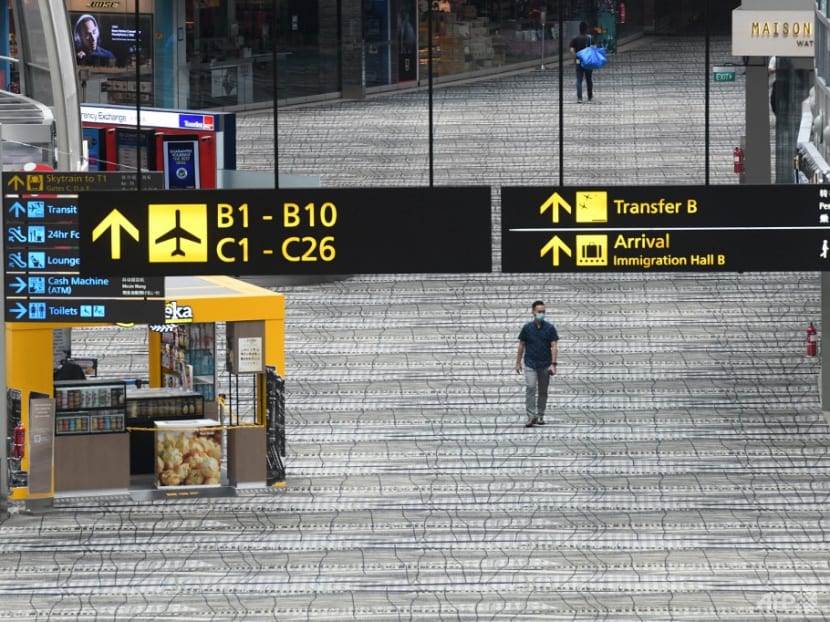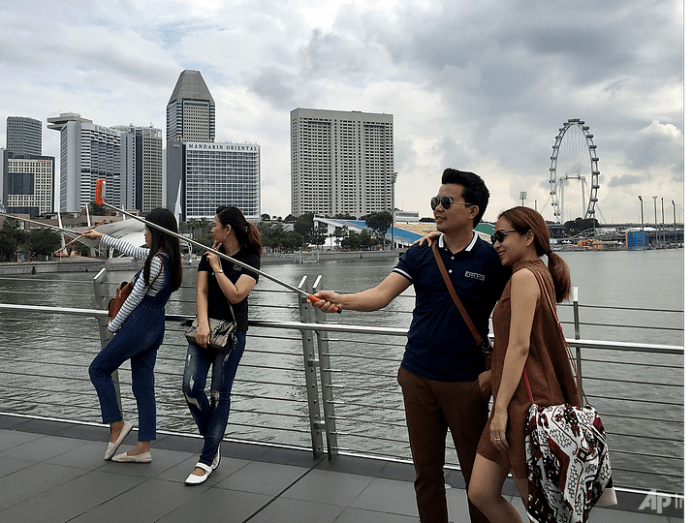Commentary: Will easing COVID-19 restrictions bring tourists back to Singapore?
Changes in domestic measures are welcome, but the remaining ones may hold back Singapore’s tourism industry from getting ahead before competitors re-establish themselves, says business and travel journalist Raini Hamdi.

A traveller is seen at Changi Airport in Singapore. (File photo: AFP/Roslan Rahman)
SINGAPORE: Nine months after the Government charted a road map towards living with COVID-19 in Singapore, the biggest easing of restrictions announced by Prime Minister Lee Hsien Loong on Thursday (Mar 24), seemed a long time coming for most.
We rejoiced at “small big things”: From Mar 29, we can be outdoors without masks, gather and dine in groups of 10 people, enjoy live music and drink past 10.30pm at our favourite haunts. And simplified travel rules are generating real excitement in the air about the prospect of hassle-free travelling once more.
But the news seemed somewhat anti-climactic to Singapore's travel industry. “This is hardly a bold move,” Mr Arthur Kiong, CEO of Far East Hospitality Management told me.
There’s a sense that Singapore could afford to do so much more, especially when neighbouring Cambodia has led the way in removing all travel restrictions. Domestic restrictions have also been removed, according to Phnom Penh-based tour operator, Jacques Guichandut, who is also the managing director of All Dreams Cambodia.
Australia is lifting the pre-departure test on Apr 18, although some states may insist on on-arrival testing.
Farther away, since early February, several European and Nordic countries have followed Denmark's lead in scrapping most travel and other domestic restrictions, such as mandatory masks and vaccine certificates to enter restaurants.
“If we were to expect inbound leisure travellers, restrictions here cannot be stricter than those of other countries which have eased them”, said Mr Kiong. After all, who would want to go on a holiday with more restrictions than at home?
The bold move would be to remove all local restrictions. It's what Switzerland is doing, despite cases soaring by an average of about 17,000 new infections a day. Its Interior Minister Alain Berset said that such hikes were to be expected but there was no cause for alarm as hospitals could cope. The country lifted most measures on Feb 17, save for two – masks in public transport and five-day isolation for COVID-19 patients. These, too, will go at the end of March.
The conditions are ripe for this in Singapore: The Omicron wave is “subsiding”. There is strong immunity in the population, with an “overwhelming majority” fully vaccinated or have received their booster, and those who have recovered after infection. "Crucially, the healthcare system remains resilient", said Mr Lee when announcing the changes.
Remaining restrictions – such as a pre-departure test (although under review), mandatory masks indoors and safe distancing in mask-off settings – may take away Singapore’s opportunity to overtake Thailand and Hong Kong as Asia’s tourism and financial hub.
WILL TOURISTS COME FOR FORMULA 1 AND OTHER EVENTS?
Take the HSBC Singapore Rugby Sevens, for example. On Mar 26, barely two weeks to the event, tickets still had not gone on sale, leaving thousands of fans on tenterhooks. Its official Facebook page says that it is “working with the authorities to deliver the best experience come April”.
But fans aren’t sure if they will get the most out of this typically rumbustious event. One fan commented that the Sevens was one of their favourite events of the year, with “lots of drinking, cheering along with our friend, dressing up and having a great time”, but questioned how the new rules would apply, wondering if it will be “mask on, no food or drink, seated far away from friends”.
Another said that tickets were taking so long to be announced that his wife took matters into her own hands and booked a five-night stay in Kota Kinabalu instead.
As the forerunner of the Singapore Formula 1 Grand Prix in September, the Sevens is the showcase of how Singapore plans to host large-scale events that are crucial for bringing back foreign visitors to the city.
My friend, Mr Henry Widler, is an F1 aficionado who aims to visit 15 F1 races this year. Singapore is on his list but he’s watching restrictions closely.
“Restrictions could be a factor for me to skip the Singapore event. I attended the races in France and Italy in 2021, where the only requirement was to show an antigen test. This was when the COVID-19 situation was much more serious. Masks were not compulsory and I'm not aware of any outbreak after the races,” said Mr Widler.
He said that ideally, F1 conditions should be clear “a couple of months ahead” for visitors from Europe and the Americas who want to secure air tickets and hotel bookings well in advance, instead of shelling out more for last-minute bookings.
“I cannot understand how a progressive nation like Singapore could be one of the last ones to lift restrictions,” said Mr Widler.
As for indoor events, Mr Robert Hecker, managing director Pacific Asia, Horwath HTL, a hotel consultancy, believes that indoor mask requirements will remain through the year unless COVID-19 cases drop to low levels. It is the “main deterrent” for networking-focused events like HICAP, he said, referring to the Hotel Investment Conference Asia-Pacific slated to be held in Singapore this October, after it was cancelled last year.
For events and leisure tourists to return, it's not just a matter of ease of entry. Life must return to normal.
TOURISM INDUSTRY’S TEMPERED EXPECTATIONS
While they appreciated the new measures, Singapore’s hoteliers and analysts are not counting on a deluge of tourists.
China, the biggest market for Singapore, is not expected to open this year. Japan isn't likely to rebound quickly either. There will be fierce competition over other major markets like India, by destinations such as Thailand, which also foresees a dip in Russian tourists.
“It's hard to foresee that as we open up more, the gates will be flooded instantly", said Mr Jesper Palmqvist, the Asia-Pacific director of STR, a hotel data intelligence provider.

Singapore hotels are bracing themselves for business to get worse before it gets better.
Far East Hospitality Management’s Mr Kiong expects “turmoil” and the risk of a price war as room inventory floods back into the market due to the end of government quarantine contracts.
“This equates to about 30 to 40 per cent of hotels going from full occupancy to zero occupancy overnight,” said Mr Kiong. “There will be a period of turmoil as the market adjusts itself. Discounting to fill rooms will risk starting a price war. Cooler heads must prevail – we need to win market share by offering superior value, not price undercutting.”
On top of losing the “generous safety net” provided by authorities, Singapore hotels are likely to see a shrinking staycation market, STR’s Mr Palmqvist said. “Domestic business, which has pricing power and boosts weekend occupancies, has held up surprisingly well for a long time but arguably, many Singaporeans will now be keen to visit other Southeast Asian destinations which have opened up,” he said.
He expects any real, sustained and stable demand for Singapore hotels only in the third quarter.
FEARS OF ANOTHER “OVERREACTION” TO NEW VARIANTS?
Ending restrictions is by no means a victory over COVID-19. By now, no one expects it to go away once and for all.
Already lurking in the air is the new variant, Deltacron, a cross between Delta and Omicron – the two variants responsible for major global surges. Little is still known about its transmissibility, severity and ability to evade immunity, and we don’t know when other variants will emerge.
Will governments be quick to bring back restrictions whenever a new variant emerges, as they did with Omicron?
Mr Kiong thinks not. “We need to live with COVID-19 and move forward. If not, the economic consequence of prevention is worse than the disease itself”, he said.
Andrew Tran Nam Hung, senior project manager at Bullish, a digital exchange, summed up the feeling most people probably have.
“There may be a spike in cases, but who cares. We are too tired already. Hopefully, with this move, Singapore will be the shining jewel in the East once again."
Raini Hamdi is a Singapore-based business journalist who writes on hospitality, travel and tourism in Asia. She is Pacific Asia Travel Association Journalist of the Year and has authored two books on hospitality.














